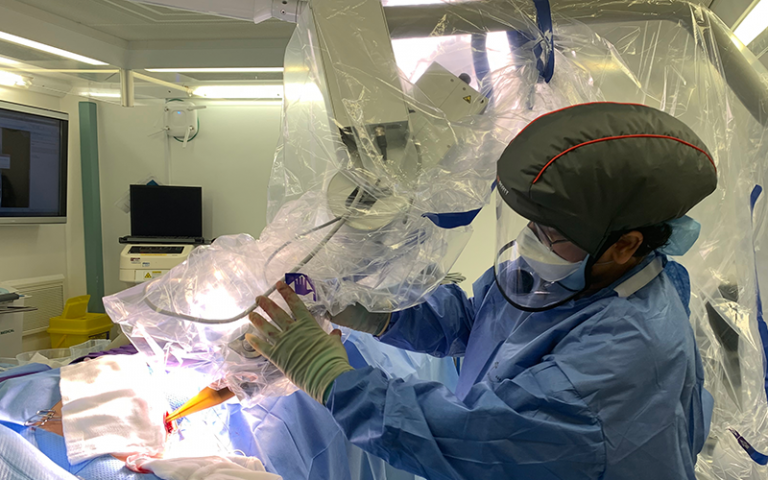Single-dose radiotherapy transforms breast cancer patient care
UCL clinicians have pioneered a single-shot targeted radiotherapy for breast cancer, delivered in the same operation as tumour surgery, removing the need for follow-ups and reducing side-effects.

22 April 2022
One in eight women will be diagnosed with breast cancer during their lifetime. Over 90% will have surgery to remove the tumour and two-thirds will also have radiotherapy to help prevent recurrence.
Traditional radiotherapy is given to the whole breast from outside the body (external beam radiotherapy, EBRT) requiring daily hospital visits for three to six weeks, starting several weeks after surgery. This prolonged course requires daily travel to the radiotherapy centre, often many miles away from the patient’s home, disrupts patients’ lives and delays recovery from the trauma of having breast cancer.
Targeted, low-energy radiation
Single-shot targeted intraoperative radiotherapy (TARGIT-IORT) was developed and validated internationally by a team at UCL’s Division of Surgery and Interventional Science, led by Professor Jayant Vaidya.
Given during the same operation as tumour removal (lumpectomy) instead of during multiple follow-up visits, it significantly reduces the impact of breast cancer treatment on patients’ lives. It also reduces the chance of death from non-breast cancer related causes. National and international clinical guidelines now recommend its use and, since 2014, the number of patients receiving TARGIT-IORT has increased from 8,000 to 45,000 by October 2020.
The low-energy radiation procedure can be performed in a standard operating theatre and involves inserting spherical applicators (1.5 – 5cm) into the tumour bed after tumour removal to deliver the treatment in 15-40 minutes.
A major reduction in toxic effects
Between 2000 and 2012, a large randomised trial (TARGIT-A) followed 2298 women from 32 centres in ten countries through treatment to compare ‘risk-adapted’ TARGIT- IORT with the standard treatment of three to six weeks whole-breast radiotherapy (EBRT) following lumpectomy.
The ‘risk-adapted’ approach meant that all patients in the experimental arm received TARGIT- IORT during lumpectomy, and about 20% also received whole breast radiotherapy if they were found to have specific risk factors such as positive margins at surgery.
Long-term follow up confirmed that TARGIT-IORT was as effective as standard radiotherapy in preventing cancer recurrence at lower toxicity and cost. Deaths from other causes, such as heart disease, lung problems, or other cancers were reduced by almost half, as a result of avoiding the toxic effects of several weeks’ radiotherapy treatment.
Each patient saves approximately 45 hours of their time (travel, waiting and clinic appointments) and enjoys fewer interrupted days during their breast cancer treatment. The hundreds of miles in travel avoided by 45,000 people treated to date, equates to a saving of approximately 5.6 million kg of CO2 emissions.
A better experience for patients
During the 2020 COVID-19 pandemic, TARGIT-IORT was recommended in “COVID-19” national and international guidelines in UK, USA, Europe, Germany, Singapore, allowing vulnerable cancer patients to avoid unnecessary viral exposure during hospitals visits for radiotherapy treatment.
Globally, 45,000 patients in 38 countries have benefited from this procedure, saving millions in healthcare costs and unnecessary travel, and avoiding 2,000 deaths from non-breast cancer causes.
One of the many women who have benefited is BBC Radio presenter Kirsty Lang. She said of her experience: "My operation went so smoothly that I felt like a bit of a fraud. I went under the knife at lunchtime and by late afternoon I was told the tumour had been successfully removed and there was no sign of the cancer having spread. I didn’t even stay overnight and I was back presenting Front Row on Radio 4 six days later.”
Research synopsis
Targeted intraoperative radiotherapy at the time of lumpectomy for patients with early breast cancer
Investigators at UCL have developed and validated “single-shot” targeted intraoperative radiotherapy (TARGIT-IORT) for breast cancer. The innovation means radiotherapy to prevent cancer recurrence is completed in 15-40 minutes during surgery to remove the tumour and under the same anaesthetic, instead of 15-30 separate hospital visits for post-operative whole-breast radiotherapy. Patients undergoing TARGIT-IORT experience less pain, fewer side effects, and improved quality of life. In addition, deaths from radiation-induced cardiovascular and lung diseases and other cancers are reduced. TARGIT-IORT is recommended in national and international clinical guidelines. Globally, 45,000 patients (37,000 since 2014) have benefited in 38 countries, saving approximately GBP30,000,000 in healthcare costs and 20,000,000 miles in unnecessary travel to clinics, and avoiding 2,000 deaths from non-breast cancer causes.
Links
- Professor Jayant Vaidya’s academic profile
- UCL Division of Surgery and Interventional Science
- UCL Faculty of Medical Sciences
- UCL Faculty of Medical Sciences REF 2021
 Close
Close

